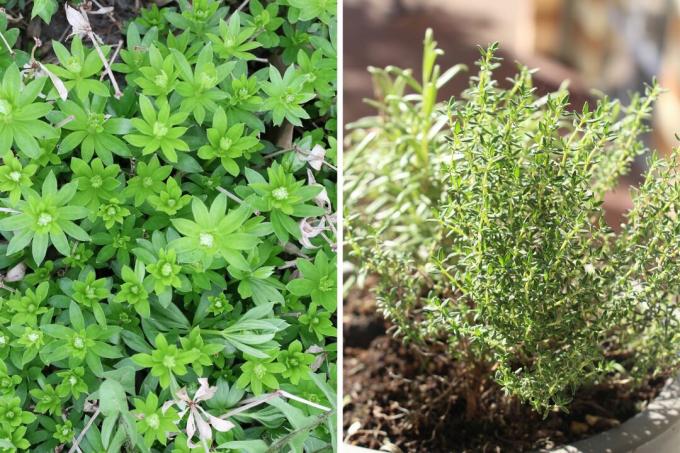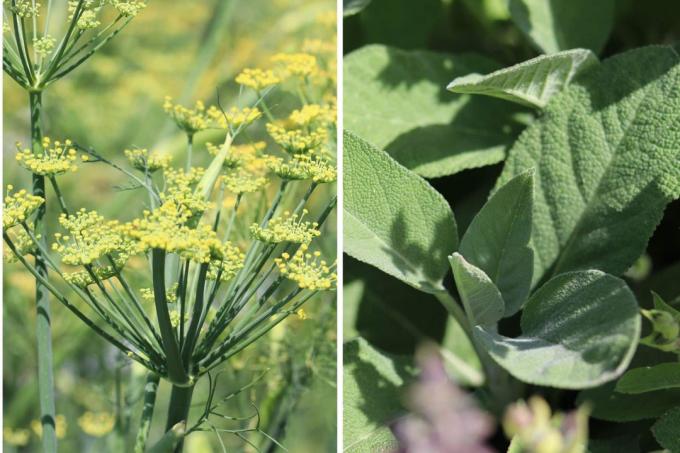
Herbs are aromatic and versatile. But not all herbs get along with each other. You can find out why here. In our table you will also find herbs that you should not plant next to each other.
In a nutshell
- Mixed cultures in the herb bed are generally an advantage
- Incompatibilities between herbs must be taken into account
- especially between annual and perennial herbs
- Location and growth important factors
Table of contents
- Causes of intolerance
- location claims
- growth behavior
- water and nutrient requirements
- culture duration
- ingredients
- These herbs don't get along: Table
- incompatible with himself
- Loner in the herb bed
- frequently asked Questions
Causes of intolerance

In the realm of herbs, there are true dream partnerships, but also competitors that it is better not to plant in the immediate vicinity. Because the preferences of individual types of herbs in terms of location and care can vary greatly. As a result, they can inhibit each other's growth, suppress or displace each other. The following are the most common reasons why herbs do not get along with each other.
location claims
Not all herbs do well in the same spots in the garden. They need different conditions to thrive.
- some tolerate full sun
- others prefer semi-shade
- including many local herbs
- Mediterranean herbs are particularly sun-hungry
- e.g. B. Thyme, sage, rosemary or basil
- prefer it to be drier and less nutritious
- do not plant Mediterranean herbs together with native herbs

Tip: Species such as wild garlic or woodruff prefer shady locations. If you plant them next to Mediterranean herbs, for example, they cannot develop and die.
growth behavior
The fact that herbs do not get along with each other and should not be planted together is often due to their different growth rates.
- grow differently both above and below ground
- vigorous herbs always dominant
- Species with more compact habit or expansive foliage
- do not plant next to weak-growing herbs
- dominant species would crowd out or overgrow weaker ones
Tip: Due to the different growth patterns, it makes sense not to only plant shallow or deep-rooted species, but to combine them with each other.
water and nutrient requirements
The deviating water and nutrient requirements also inevitably lead to intolerance with unsuitable planting partners. So you should z. B. Do not plant dill and sage together, because while dill needs to be kept moist, sage prefers dry locations. The situation is similar with the nutrients. If you plant several heavily consuming herbs next to each other, they will quickly deplete the soil. The herbs withdraw the nutrients from each other, so they do not get along with each other. As a result, they cannot be optimally cared for and wither away.

culture duration
The situation is similar for annual and perennial herbs. The lifespan of both types is mainly at Plantings in flower boxes essential. In principle, annual and perennial herbs get along well. However, since the annuals have to be removed from the pot in autumn and replaced by new ones every year, the perennials are disturbed by the constant unrest in the soil area. In addition, their roots could be damaged.
ingredients
Many herbs give off more or less intense fragrances that may not be tolerated by every neighbor.
- some herbs are sensitive to the scents of others
- can lead to incompatibilities
- and a. in the form of growth retardation
- In the worst case, plants can die

A good example of this is chives and parsley. Chives secrete a special acidity that parsley does not tolerate at all. It is all the more important to avoid unfavorable planting partnerships.
Tip: In the right combination, herbs can certainly benefit from each other, for example by helping to keep pests away and attract beneficial insects with their scents and aromas.
These herbs don't get along: Table
| herb | Bad neighbors |
|---|---|
| basil | Dill, Marjoram, Mint, Peppermint, Sage, Thyme, Rue, Lemon Balm |
| savory | peppermint |
| dill | Basil, tarragon, fennel, garden cress, cumin, parsley, sage, chives |
| fennel | Dill, garden cress, coriander, caraway, marjoram, wormwood |
| garden cress | Dill, fennel, chervil, coriander, parsley |
| Nasturtium | Parsely |
| chervil | coriander, parsley |
| marjoram | Fennel, oregano, thyme |
| oregano | Marjoram, Peppermint |
| Parsely | Dill, tarragon, garden cress, chamomile, nasturtium, chervil, coriander, lavender, spearmint, peppermint |
| peppermint | Basil, savory, chamomile, parsley, sage, thyme |
| rosemary | tarragon, chives |
| sage | Basil, Dill, Peppermint |
| chives | coriander, rosemary |
| thyme | marjoram, mint |
| lemon balm | basil |
incompatible with himself

There are herbs that are incompatible with others and those that are incompatible with themselves. Without regular relocation, this can lead to soil fatigue. A prime example of this is parsley, which is not compatible with itself or with all other umbellifers. If umbellifers are planted next to each other or in the same place over several years, incompatibilities are inevitable.
Tip: In order to avoid such problems, you should take a break from planting for two to three, preferably four years.
Loner in the herb bed
Last but not least, there are herbs that are best left alone as they don't like it when someone gets too close. The main reason for this is the space requirement, because some herbs take up a lot of space in order to be able to spread unhindered. For example, lovage, lavender and laurel as well as wormwood, southernwood, angelica and lemongrass are typical loners in the herb bed.

frequently asked Questions
Even if you should avoid intolerances, you can plant herbs that do not get along under certain conditions even in the smallest of spaces. This can be done, for example, in a so-called herb spiral. It can be placed in different climate zones, e.g. B. divide into dry, lean and nutrient-rich zones so that these herbs cannot get too close to each other. Once the perfect location has been found, they are then arranged according to their growth behavior and duration of cultivation.
Only plant annuals or perennials together, avoid nutrient competition and major differences in plant height, and combine herbs that support each other.
Herbs with similar site requirements that do not hinder each other's growth can be planted together without hesitation. Mediterranean herbs such as rosemary, sage, thyme or lavender generally get along well with each other. The ingredients of individual herbs can also have a positive effect on other herbs, for example in terms of robustness, growth or taste. Rosemary, for example, promotes the growth of basil. There are also herbs that get along with almost everyone else. These include borage or lemon balm.
